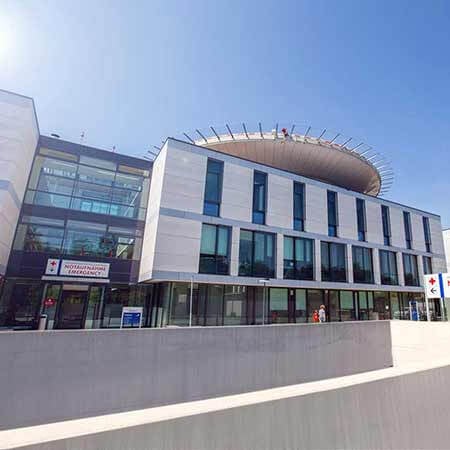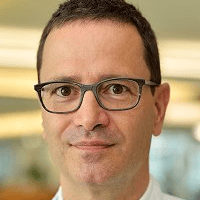Diagnosis and Stereotactic Biopsy for Glioblastoma (brain Cancer)
Treatment prices are regulated by national law of the corresponding countries, but can also include additional hospital coefficients. In order to receive the individual cost calculation, please send us the request and medical records.

Department of Adult and Pediatric Neurosurgery, Spinal Surgery
The Department of Adult and Pediatric Neurosurgery, Spinal Surgery offers all the possibilities of modern surgical treatment for diseases of the central and peripheral nervous system in patients of all ages. More than 6,000 surgical procedures are performed annually in the department's high-tech operating rooms. Both planned and emergency neurosurgical procedures are performed here. The department's surgical team focuses on patients with cerebrovascular diseases, brain and skull base tumors, spine and spinal cord diseases, cerebrospinal fluid circulation disorders, and pathologies of the peripheral nervous system. The department's team of physicians also has extensive experience in functional neurosurgery: specialists perform deep brain stimulation for movement disorders, spinal cord stimulation for back pain, and vagus nerve stimulation for epilepsy. The department works closely with neurologists, radiologists, and nuclear medicine specialists to provide patients with the highest level of comprehensive medical care. The department is recognized as one of the top neurosurgical centers in Germany and beyond, as evidenced by consistently high treatment success rates and numerous quality certifications, including the German Cancer Society (DKG) Certificate, the German Spine Society (DWG) Certificate, and the Leading Medicine Guide Certificate.







Department of Adult and Pediatric Neurosurgery
The Department of Adult and Pediatric Neurosurgery offers the full range of surgical treatment of diseases of the brain, spine, spinal cord and nerves in adults and children. The department keeps pace with new trends in medicine, as well as contributes significantly to their development. Therefore, the most modern diagnostic and therapeutic methods are available here. An individual approach to each clinical case is crucial to ensure optimal treatment results with the preservation of all neurological functions.


Department of Adult and Pediatric Neurosurgery
According to the Focus magazine, the Department of Adult and Pediatric Neurosurgery ranks among the top German medical facilities specializing in the surgical treatment of brain tumors! The department offers the full range of diagnostics and surgical treatment of diseases of the central and peripheral nervous system. A specially trained team of pediatric neurosurgeons provides treatment for various neurosurgical pathologies in children. During the treatment, the doctors use state-of-the-art equipment, in particular, imaging-guided neuronavigation, functional imaging (fMRI), intraoperative mapping, intraoperative videoangiography, etc.






The statistics demonstrates the constant growth of oncological pathology in recent years. The same is observed with brain tumors, which require specific measures for the precise diagnosis making.
First symptoms
The first symptoms of the tumor in the central nervous system do not give a clear picture, as they are very similar to the symptoms of many other types of brain cancer.
If general symptoms of brain tumors are manifested due to damage of the entire central nervous system and affect the general well-being, then glioblastoma symptoms depend on the lesion area.
Each part of the brain is responsible for certain functions. Depending on the location of the tumor, various brain regions are affected. Therefore, the diagnosis can cause various symptoms.
Symptoms can indicate where the tumor is located within the brain. Paralysis and convulsions are characteristic of tumor in the frontal lobes; loss of vision and hallucinations indicate the tumor in the occipital one. An affected cerebellum will result in coordination disorders, while a tumor in the temporal lobe will lead to hearing loss and memory loss.
Typical symptoms of tumor presence in the central nervous system are:
- Headache. Headache is the most frequent and early symptom of a brain tumor.
- Vomiting. Vomiting is also a typical symptom of the diagnosis and often occurs in the morning.
- Dizziness. Usually, this symptom appears at the advanced stages of brain cancer.
- Mental disorders. Clear consciousness, memory, thinking, perception, and ability to concentrate are usually impaired.
- Vision impairment
The speed and intensity of the development of the symptoms depend on the location of the tumor and the characteristics of its growth. Tumors can press on some parts of the brain, which leads to a clear manifestation of symptoms.
In the presence of at least a few of the listed symptoms, it is necessary to start a treatment.
Diagnostics
Glioblastoma is the most aggressive form of primary brain tumors, among other tumors of the central nervous system. For a long time, doctors have tried to develop new treatments for glioblastoma diagnosis, but only recently progress has been made.
Conventional imaging techniques, such as magnetic resonance imaging (MRI) and computed tomography (CT), cannot illustrate what is happening in the brain and inside a tumor effectively enough.
An imaging technique that is used to evaluate how patients with glioblastoma respond to therapy is magnetic resonance spectroscopy. Unlike standard MRI, which only sees structural features of the tumor, magnetic resonance spectroscopy can identify the changes in the tumor that indicate how quickly the tumor grows.
MRI is the most widely used technique for detecting brain tumors. However, conventional MRI is not able to detect changes in cell density, cell type transformation, or biochemical composition of the tumor. All of this can be detected with magnetic resonance spectroscopy.
Besides, the tumors of different physiology often look the same on MRI. Therefore, MRI and magnetic resonance spectroscopy are complementary methods in diagnosis, monitoring of diagnosis progression, and response to therapy.
The ability to provide early non-invasive detection of diagnosis is highly valued by both patients and doctors. Hence, the number of hospitals that include magnetic resonance spectroscopy into their clinical practice is growing constantly.
Unlike the conventional MRI imaging, which scans the entire brain, magnetic resonance spectroscopy works like a virtual biopsy and allows clinicians to assess the peculiarities of the targeted tumor.
There’s also a positron emission tomography, which is a modern, highly sensitive method of diagnostics. This examination helps to determine the presence of cancerous tissues after surgery, identify cancer recurrence, cancer metastasis to bone tissues and other organs. Positron emission tomography and computed tomography include dual imaging with the use of positron emission tomography and computed tomography equipment.
Stereotactic biopsy
Despite all the information on innovative scanning methods, the basis for making an accurate diagnosis can only be information from the study of tumor cells under a microscope. Material for such analysis is obtained with the help of biopsy.
If the tumor is located in the brain, performing the manipulation is fraught with certain difficulties. A stereotactic biopsy allows solving this problem. The essence of the method is to elaborate a safe access scheme to a target area based on coordinates calculated from the results of prior scanning.
Stereotactic biopsy has been used for a long time and is the main method for obtaining clear and reliable results that contribute to surgery success.
The use of this technique allows doctors to obtain biopsy material with guaranteed accuracy and maximum comfort for the patient, minimizing the risk of complications development.
A stereotactic biopsy can be performed in the form of a biopsy with a stereotaxic frame or biopsy with the use of a navigation system.
- Biopsy with stereotaxic frame.
Biopsy with the use of stereotaxic frame (frame-based) is a traditional procedure with high accuracy rate.
Before conducting a biopsy in the clinic, a patient undergoes magnetic resonance imaging with contrast enhancement. Planning of the access point, the trajectory of the instruments introduction, and the target of the biopsy is performed.
The first stage of the biopsy is the installation and fastening of the main ring with special screws, while the patient is under local anesthesia. A localizer with markers is put on the ring and the patient is sent for a scan.
At the workstation, the neurosurgeon compares the obtained information with the results of MRI. The computer analysis of the images is performed immediately, and as a result, the coordinates of the target point are obtained. The patient is transported to the operating room for a stereotaxic procedure.
According to the obtained results, the neurosurgeon makes a small incision. Through it, along a pre-calculated path, a biopsy needle is inserted and the material is harvested.
- Biopsy with the use of a navigation system.
Biopsy with the use of a navigation system without a stereotaxic frame (frameless) takes less time and is more convenient for the patient and the neurosurgeon.
After MRI, the information is transferred to the navigation system. The technique makes it possible to establish the position of the entry point, the site for the biopsy, and the trajectory of the biopsy instrument moving.
In the operating room, under general or local anesthesia, the neurosurgeon touches the patient with a special pointer, and the computer shows the desired point. The tissue is harvested through the hole, using a biopsy needle.
Thanks to modern techniques in the field of brain surgery, stereotactic biopsy has become an outpatient procedure, which is mainly performed under local anesthesia with maximum comfort for the patient. In the absence of complications, a patient is discharged from the hospital on the next day, after performing the control computed tomography scan.
Previously, any intervention on the brain, that included biopsy and surgery, was accompanied by a huge risk of damage to important structures of the brain that are responsible for movement, coordination, sensory perception, etc. Nowadays, practically all surgery types are performed using the stereotactic method.
Goals of stereotactic biopsy:
- To clarify the histological structure of a hard-to-reach tumor before surgery
- To assess the affected brain structures before surgery
- To drain abscesses of the brain
- To drain the ventricles of the brain (in cases of occlusive hydrocephalus and hemorrhagic stroke)
What are the risks?
The biggest risk is bleeding in the tumor and the brain due to the damage of the biopsy needle. The risk of bleeding from a biopsy is around 5%, and the risk of mortality is up to 1%. Additional risks can include headaches on the biopsy site, infections, and seizures.
To minimize risks, the patient's medical condition is assessed and improved after stereotactic biopsy or before beginning stereotactic surgery. Intraoperative antibiotics can prevent bleeding before surgery. It is also beneficial to keep the patient overnight in the hospital, for observation before stereotactic surgery.
Cost of treatment of glioblastoma in the best hospitals in the world
The cost of treatment of glioblastoma in the best-rated hospitals on the Booking Health website is relatively low. You can save up to 40% of the standard hospital prices for foreigners by booking the medical program here.
With Booking Health, you can undergo the treatment of glioblastoma at an affordable price. The cost of treatment varies in different countries, as the prices depend on the hospitals, the diagnosis, and the complexity of treatment. The cost of treatment with stereotactic biopsy abroad goes as follows:
- Germany – from 15,140 EUR to 25,601 EUR
- Austria – approximately 17,500 EUR
- Turkey – approximately 8,300 EUR
- Spain – approximately 8,200 EUR
- India – approximately 6,100 EUR
You can visit the Booking Health website to find out the exact price for the desired treatment.
Where can I undergo the treatment of glioblastoma?
The best hospitals for the treatment of glioblastoma are as follows:
- University Hospital Bergmannsheil Bochum, Germany
- Charite University Hospital Berlin, Germany
- University Hospital HM Monteprincipe Madrid, Spain
- University Hospital for Neurosurgery Salzburg, Austria
- University Hospital Freiburg, Germany
You can check out the full list of hospitals on the Booking Health website.
How can I undergo glioblastoma treatment abroad?
Organizing the treatment of glioblastoma abroad by oneself can be challenging. It is safer, easier, and less stressful to shift some responsibility onto a medical tourism agency that will support you throughout your journey.
We represent the best hospitals in the world, and you can choose which one is right for you. Clinicians of the best hospitals will do everything to make the treatment as comfortable and effective as possible.
If you want to get more information on hospitals, the cost of treatment with surgery, or the cost of diagnostics with biopsy, please leave a request on the Booking Health website. We will contact you as soon as possible, and answer all your questions.

